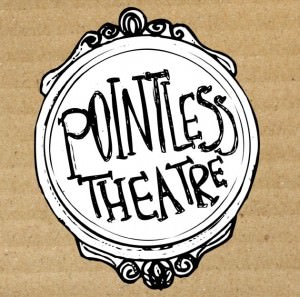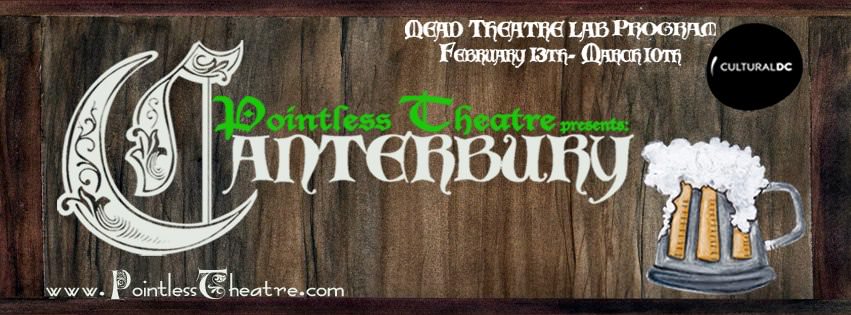I’m thrilled to be kicking off this series of articles about our upcoming show Canterbury for DC Theater Arts by talking about the long and unusual process by which the script for our newest project has come together.

When Pointless Theatre decided to propose an adaptation of Geoffrey Chaucer’s The Canterbury Tales for the Mead Theatre Lab program at Flashpoint in September of 2011, we spent a lot of time at the beginning of our process figuring out what shape the adaptation would take. As the adapting dramaturg, I wanted to find a structure for the show that would highlight the things we loved about our source material while allowing us to present Chaucer’s classic tales in a way they’ve never been presented before – a Pointless Theatre puppet spectacle which honors the traditions of these beloved stories for those who already love them while opening them up in a new way audiences who haven’t yet discovered them.
The Canterbury Tales, written at the end of the 14th century by Geoffrey Chaucer, follows a collection of pilgrims coming from all walks of life as they make a religious pilgrimage to the cathedral at Canterbury. Along the way, they have a storytelling contest to keep themselves entertained, with the prize of a free dinner at the Tabard Inn in Southwark to motivate them. I fell in love with The Canterbury Tales in high school mostly due to the incredible stylistic range of the stories that the pilgrims tell: there are Arthurian legends, courtly romances, barnyard fables, biblical sales pitches, and slapstick comedies with more dick and fart jokes than I could have possibly expected in a book assigned by one of my high school teachers. I loved how Chaucer gave each pilgrim a unique voice and tone for their story that made them feel like a real person, and capturing that feeling of having a distinct voice for each character became one of my biggest goals in putting together Pointless’ adaptation of The Canterbury Tales.
We as a company wanted the show to be in a modern prose that would be familiar to our audience’s ears instead of using Chaucer’s elevated middle-English verse, but we wanted to maintain the incredible diversity of voices within Chaucer’s work and keep all the characters sounding as distinct as possible. We eventually came to the conclusion that the best way to make each character’s tale feel like it came from a unique voice was to actually have each character’s tale be written by a different playwright, and so we decided to have an open submission process for DC-area writers that wanted to be a part of the project – our first-ever open call for scripts as a company.

In our initial meetings about Canterbury, it immediately became clear to us that this show was not going to be an evening of one-act plays, that beyond the stories themselves there would be an outer frame of the pilgrims interacting and reacting to the stories which had just been told. The insights into the pilgrims themselves are a big part of what makes Chaucer’s original work so much fun to read, and the understanding of who the pilgrims are that Chaucer provides through his outer frame is essential to understanding why they tell the stories that they tell. As a company with a strong background in improvisation, we decided to have a two-week workshop period before beginning the traditional rehearsal process in which we would devise the interactions that make up the outer frame through improvisation and character work. These improvisations ranged from the kind of short-form games that make up a lot of improv comedy shows to long-form improvisations in which we gave the actors a beginning point and an end point in the story and had them find their way from one to the other as their characters. We are using these improvisations as the raw material for our outer frame, giving the cast the chance to really define the voices of their characters and the arc of the show as a whole.
Right now, I’m in the process of finalizing the script for the show, bringing together the playwrights’ adaptations and videos I took of the cast’s improvisations to make a cohesive final script for Canterbury. My constant soundtrack as I’ve been finalizing this adaptation has been the Wu-Tang Clan, which I started listening to in high school around the same time as I started reading The Canterbury Tales. Listening to “36 Chambers” this summer while thinking about Canterbury I was struck by the way that while each of the rappers in the group has a distinct voice and style that’s all their own, the RZA’s production on each of the tracks makes them all part of one consistent whole, each track a unified product of many separate voices. That’s been my consistent personal metaphor in thinking about my role as an adapting dramaturg in this process, bringing together the voices of eight playwrights as well as those of the cast and creative team to create one unified script which celebrates Chaucer’s classic work in a new way.
This is an unusual way of bringing a show together, and it’s a way of working that none of us have a lot of experience with, but it’s been an incredible pleasure working on an adaptation of one of my favorite pieces of literature with Pointless Theatre and our outside writers and the final product is turning into something more and more special with each passing day. I’m looking forward to seeing where this show takes us next, and I can’t wait for Pointless Theatre to share all of the incredible work that’s been done on this show with DC when we open at Flashpoint this February.
Canterbury plays from February 13 to March 10, 2013 at Pointless Theatre Co. at the Mead Theatre Lab at Flashpoint – 916 G Street NW, in Washington, DC. For tickets, purchase them online, or call OvationTix at (866) 811-4111.





